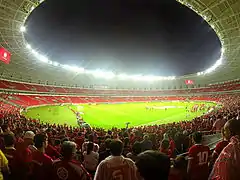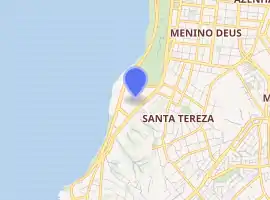Estádio Beira-Rio
Estádio José Pinheiro Borda, better known as Estádio Beira-Rio or Gigante da Beira-Rio or simply Beira-Rio, (Portuguese pronunciation: [esˈtadʒiu ˈbejɾɐ ˈʁiu], Riverside Stadium) due to its location beside the Guaíba River, is a football stadium in Porto Alegre, Brazil. It serves as the home stadium for Sport Club Internacional, replacing their previous stadium, the Estádio dos Eucaliptos. It is named after José Pinheiro Borda, an elderly Portuguese engineer who supervised the building of the stadium but died before seeing its completion.
Beira-Rio, Gigante da Beira Rio | |
 | |

| |
| Full name | Estádio José Pinheiro Borda |
|---|---|
| Location | Av. Padre Cacique, 621-1571, Praia de Belas, Porto Alegre, Rio Grande do Sul, Brazil |
| Coordinates | 30°3′56.21″S 51°14′9.91″W |
| Owner | Sport Club Internacional |
| Operator | SPE Holding Beira-Rio S/A |
| Capacity | 50,128[1] |
| Record attendance | 106,554 |
| Field size | 105 m × 68 m (344 ft × 223 ft) |
| Surface | TifGrand |
| Construction | |
| Broke ground | September 12, 1956 |
| Opened | April 6, 1969 |
| Renovated | Autumn 2013 |
| Construction cost | R$ 330 million (renovation) |
| Architect | Hype Studio |
| Tenants | |
| Sport Club Internacional | |
Estádio Beira-Rio was one of the 12 venues used for the 2014 FIFA World Cup, hosting five of the matches in the tournament.
General information
- Grass: TifGrand
- Box offices: 4, with 68 booths
- Toilets: 81
- Capacity 50,128 (7,500 VIP seats)
- Executive suites 125 (70 suites + 55 skyboxes)
- Video screens 2 (100 m2 (1,100 sq ft) each)
- Parking 5,500
- Record Attendance 106,554 (Rio Grande do Sul All-Stars 3–3 Brazil national football team, on June 17, 1972)
History
In 1956, councilman Ephraim Pinheiro Cabral presented a document to the government that included a donation of part of the Guaíba, to be reclaimed for Sport Club Internacional.
Estádio Beira-Rio was constructed with the help of the club's enthusiasts and supporters. They contributed by bringing bricks, concrete and iron.
During the 1960s, Estádio Beira-Rio was called "Bóia Cativa", since it seemed that it would never be completed, especially since those were difficult times for Internacional on the field.
The stadium's debut was played on April 6, 1969, when Internacional beat Portugal's Benfica 2–1. The first goal ever scored in the stadium was done by Internacional's Claudiomiro.
Current situation
Beira-Rio is the second biggest stadium in the Rio Grande do Sul state and also South Brazil. The stadium has recently been renovated to host the 2014 FIFA World Cup. The Beira-Rio complex also houses a chapel, an events center, bars, stores and a parking building for 3,000 cars. Parque Gigante, featuring pools, gyms, football fields, and tennis courts, is located next to it. The first test event after the stadium's renovation was hosted on February 15, 2014 in a match between Internacional and Caxias, a local club, for the Campeonato Gaúcho.
Improvement and restoration
The stadium has gone through restoration and developments that makes it fit to host matches during the 2014 FIFA World Cup in Brazil. Internacional has a project of restoration and improvement of Beira-Rio complex named 'Gigante Para Sempre' (Giant Forever). The stadium has been adapted to an international standard, ready to host any national or international game. Beira-Rio is one of the only 2014 FIFA World Cup stadiums to be privately owned.
The first test event for the new stadium was on February 15, 2014. Internacional beat SER Caxias and won 4-0. The first official game was played on April 6, 2014. Internacional played against Peñarol of Uruguay and beat them 2-1.
2014 FIFA World Cup
| Date | Time (UTC-03) | Team #1 | Result | Team #2 | Round | Attendance |
|---|---|---|---|---|---|---|
| June 15, 2014 | 16:00 | 3–0 | Group E | 43,012 | ||
| June 18, 2014 | 13:00 | 2–3 | Group B | 42,877 | ||
| June 22, 2014 | 16:00 | 2–4 | Group H | 42,732 | ||
| June 25, 2014 | 13:00 | 2–3 | Group F | 43,285 | ||
| June 30, 2014 | 17:00 | 2–1 (a.e.t.) | Round of 16 | 43,063 |
Concerts
| Concerts at Estádio Beira-Rio | |||
|---|---|---|---|
| Date | Artist | Tour | Attendance |
| 10 October 2011 | Justin Bieber | My World Tour | 20,698 |
| 25 March 2012 | Roger Waters | The Wall Live | 42,436 |
| 11 April 2015 | Roberto Carlos | TBA | 40,000 |
| 17 October 2015 | Los Hermanos | Turnê de Reunião | 15,000 |
| 2 March 2016 | The Rolling Stones | América Latina Olé Tour 2016 | 49,073 |
| 12 June 2016 | Ana Carolina & Seu Jorge | Ana & Jorge | 12,000 |
| 11 October 2016 | Aerosmith | Rock 'N' Roll Rumble Tour | 19,476 |
| 8 November 2016 | Guns N' Roses | Not in This Lifetime... Tour | 50,567 |
| 2 December 2016 | Nando Reis + Natiruts + Criolo | POA Love Festival | 8,000 |
| 4 April 2017 | Elton John + James Taylor | Wonderful Crazy Night Tour | 17,987 |
| 6 September 2017 | Leonardo e Eduardo Costa | Cabaré | 5,000 |
| 19 September 2017 | Bon Jovi | This House Is Not for Sale Tour | 45,000 |
| 26 September 2017 | The Who + Def Leppard | The Who Tour 2017 | 16,000 |
| 13 October 2017 | Paul McCartney | One On One Tour | 51,000 |
| 24 October 2017 | John Mayer | The Search for Everything World Tour | 20,000 |
| 7 November 2017 | Green Day | Revolution Radio Tour | 18,000 |
| 27 February 2018 | Phil Collins | Not Dead Yet Tour | 28,000 |
| 4 March 2018 | Foo Fighters + Queens of the Stone Age | Concrete and Gold Tour | 41,000 |
References
- (PDF) https://conteudo.cbf.com.br/cdn/201601/20160122182359_0.pdf. Missing or empty
|title=(help)
- Enciclopédia do Futebol Brasileiro, Volume 2 - Lance, Rio de Janeiro: Aretê Editorial S/A, 2001.
- Sport Club Internacional Official web site